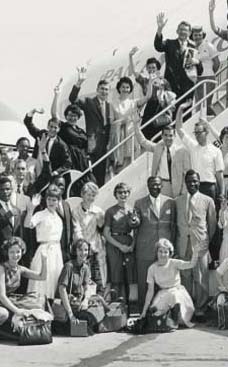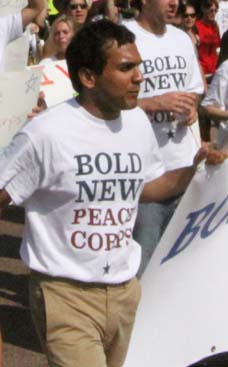
The Peace Corps was, for me and for many others, a formative experience. And there's no question that America has benefited from having a large number of citizens with deeply local experience overseas. But I think it's time to ask whether the Peace Corps, and indeed most aid programs, are a remnant of an outdated era. If Americans really want to give Kenya a hand, why not scrap the Peace Corps and instead underwrite jobs for young people who already live here so they can help their neighbors and live better lives? Or why not abandon the idea of aid altogether and instead encourage U.S. investment in businesses that create decent, long-term jobs - in my opinion the only sure way to development? That would be a far more radical idea than the Peace Corps ever was.
Kenya RPCV Karen Rothmyer writes: A Radical Alternative To Peace Corps
The Nation: A Radical Alternative To Peace Corps
by Karen Rothmyer
March 1 marked the 50th anniversary of Peace Corps.
March 2, 2011
Karen Rothmyer is a former Peace Corps volunteer and former Nation managing editor.
Last fall, while visiting the United States, I attended a Peace Corps fiftieth anniversary event at Harvard. Almost all the former volunteers who spoke, either as part of the formal program or in comments from the floor, had an anecdote about some official they'd met who recalled being taught English by a Peace Corps teacher, or some memory of life in the village where they'd been posted. The only person on the dais who expressed any uncertainty about the value of the Peace Corps was Mary Jo Bane, the Kennedy School academic dean and an early volunteer in Liberia. She commented that the Peace Corps probably helped President William Tubman maintain power longer than he would have otherwise (as Tubman grew increasingly dictatorial before his death in 1971, the efforts of volunteer teachers and rural advisers arguably helped him create an appearance of government concern for the poor), which she said "might or might not have been a good thing."
That's exactly the kind of issue Americans should be debating as they reflect not just on the past fifty years of the Peace Corps - President Kennedy signed the executive order establishing it on March 1, 1961 - but also on all the foreign aid initiatives that followed. Speaking from my own vantage point in Kenya, where I was a Peace Corps teacher, I can see how the Peace Corps might have been justified in the '60s on the grounds that a newly independent country with relatively few trained professionals needed and welcomed help. But even if that was so then (and I'm not sure it was), today Kenya is full of university graduates with significant skills - I know because I have taught some of them at the University of Nairobi - who can't get jobs. This pool of wasted talent not only means slower development; it also represents a potential threat to stability. How does that square with the originally stated Peace Corps goal of promoting "world peace and friendship"?
Speaking directly to the point raised by Bane - that the Peace Corps may have helped to tamp down, rather than encourage, demands for change in Liberia - I wonder how much we Kenya volunteers, in a small way, did the same thing. Countries need an engaged citizenry that insists on decent services and public accountability. But early on, Kenya developed a political class that seems to think that if it throws citizens a few bones from time to time (many of them supplied by donors), it can concentrate most of its efforts on looking out for its own political and financial interests.
So why is the United States still sending Peace Corps workers to Kenya and many other countries? Maybe it's because the Peace Corps has always been more about U.S. superpower goals than about world peace. I recently read a book by Michael Maren, a former Peace Corps volunteer in Kenya who went on to become an aid worker in Somalia and later wrote about his experiences in The Road to Hell: The Ravaging Effects of Foreign Aid and International Charity. Maren writes of being posted to a village on the eastern slope of Mount Kenya: "The more time I spent in the village the more aware I became of the connection between the desire to enlighten, to do development work, and the desire to rule."
I don't fully subscribe to Maren's point of view. I do know, though, that his suspicions about aid are widely shared. A Kenyan acquaintance of mine, Professor Macharia Munene, argues that what he calls "aid addiction" is a deliberate policy aimed at keeping third world countries in the grip of the West. "First came the territorial colonialists, then the neo-colonialists, and now, since the 1980s, the West continues colonialism in other ways through the World Bank, the IMF and the NGOs," he says.
The Peace Corps was, for me and for many others, a formative experience. And there's no question that America has benefited from having a large number of citizens with deeply local experience overseas. But I think it's time to ask whether the Peace Corps, and indeed most aid programs, are a remnant of an outdated era. If Americans really want to give Kenya a hand, why not scrap the Peace Corps and instead underwrite jobs for young people who already live here so they can help their neighbors and live better lives? Or why not abandon the idea of aid altogether and instead encourage U.S. investment in businesses that create decent, long-term jobs - in my opinion the only sure way to development?
That would be a far more radical idea than the Peace Corps ever was.















